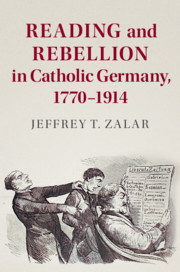'With the scarcity of English language works on nineteenth-century German Catholic culture, Zalar’s study is truly welcomed. He has produced a brilliant [and] sophisticated examination of the changing reading habits of Catholics over two centuries.'
Kevin P. Spicer
Source: Contemporary Church History Quarterly
'Zalar’s work illustrates how German Catholics engaged in a long process of resistance against clerical direction and authority over what lay Catholics read … This resistance demonstrates fundamental problems with traditional conceptions of clerical authority over the laity, it questions the religious milieu’s cohesion and it gives lay Catholics … much greater agency in their own history as Catholics and Germans.'
Eric Yonke
Source: German History
'A fluently written historical narrative … Zalar’s account is a very welcome one that engages with the research on Catholicism and enlarges it in a promising way.'
Bernward Schmidt
Source: Historische Zeitschrift
‘Zalar here makes a distinguished contribution to the rich historiography of German Catholicism that has developed from the 1990s.’
Oliver Logan
Source: European History Quarterly
‘Zalar’s willingness … to explore issues too often overlooked - popular religion, reading habits, book culture - make this volume an impressive discussion of cultural response to those socio-economic and political changes that accompanied Catholic Germany’s transition to modernity.’
Ronald J. Ross
Source: Journal of Ecclesiastical History
‘Jeffrey Zalar’s excellent new study of Catholic lay reading praxis in the ‘long’ nineteenth century … debunks the myth that [clerical control] was an effective instrument of book discipline within Germany’s Catholic population … Other reviewers of this book have highlighted its importance for general, European, and German historians … [Yet it] also contains a wealth of information and insight specifically for library and book historians.’
Jeffrey Garrett
Source: Libraries: Culture, History, and Society
‘[This] study is a substantial contribution to the history of Catholicism, cultural history, and book history … The title will be an indispensable resource for scholars interested in modern German Catholicism, the history of religious reading, and intellectual history.’
Joanna Rzepa
Source: The Year’s Work in Critical and Cultural Theory
‘Zalar’s book is a welcome addition to our knowledge of nineteenth-century German Catholicism. It is based on impressive research in a variety of ecclesiastical archives and painstaking analysis of obscure journals and tracts, and [it] pushes the critique of a monolithic view of the Catholic Church further than has been done before.’
Michael Schaich
Source: The English Historical Review
‘[An] insightful and eminently readable account of the reading habits of German Catholics between the Enlightenment and the First World War … [A] subtle and sophisticated work of major significance … deserving of the widest possible readership.’
Derek Hastings
Source: The Catholic Historical Review
‘This [is] a richly contextualized and deftly argued history of Catholic reading that powerfully dispels the notion that Catholic were not participating in the worlds of learning and of entertainment that the reading of books opened up … [B]old and ambitious.’
Benjamin Ziemann
Source: The American Historical Review
‘… an impressive discussion of cultural response to those socio-economic and political changes that accompanied Catholic Germany’s transition to modernity.’
Ronald J. Ross
Source: The Journal of Ecclesiastical History
‘Reading and Rebellion in Catholic Germany is a deeply researched and carefully organized book that makes a strong case not only for rethinking the reality of a disciplined Catholic milieu, but also for rethinking the importance, in general, of reading as a force for historical change. It will be of interest to historians of modern Germany, German Catholicism, the nineteenth century, reading, and commercial culture.'
Kara Ritzheimer
Source: The Journal of Modern History



